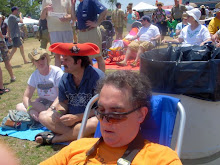Katrina Redux: Other Considerations
Thinking of Katrina, and the impacts, if any, it will have on the jury system:
An interesting story is the one of the school bus comandeered by renegade refugees. Seems that Jabbar Gibson, a twenty year old, claims police told him to take the bus, and try to get out of the city. Along the way, he filled the bus up with complete strangers and took it all the way to the Houston Astrodome.
At first, they were refused entry. They weren't on an official FEMA bus. One report claimed the bus was stolen.
I don't know about y'all, but I don't think I'd vote to convict Jabbar. Probably offer to buy him a good meal. Is he a criminal - or a hero?
And how did he managed to get the jump on the entire federal government by several hours in evacuating the first bus load of people (and probably save the bus from destruction by flooding in the process?) This kid isn't a criminal - hell, he ought to be made head of FEMA. They've done worse.
OK, so stealing a bus isn't a criminal act under these circumstances. What about "looting?" There are numerous reports of police officers looting. As one blogger notes, if police (or anyone else) needed water and food, dry shoes and clothing, so that they could survive in this chaos, well, have at it. And I think most jurors would agree.
Now, nobody needs a 40" plasma TV to survive, and those looters will probably be dealt with unmercifully by juries. But anyone taking food, water, dry clothing, or anything else that is even remotely survival-related, is hardly a threat to his neighbors, and -- if those neighbors are aware of their discretion - very unlikely to be branded by them as a criminal.
So far as Philip Monte's concern that juries will punish insurance companies for denying too many claims - the question is whether those companies will try, in good faith, to settle all arguable claims. Claims that aren't arguable will not GET to juries - they'll be dismissed on summary judgment. Claims that are arguable should be settled, quickly and fairly.
If everyone in Alabama, Mississippi and Louisiana starts having friends who feel like they've been cheated and shortchanged by their insurance company, I have no doubt that those frustrations will bubble up, and that any lawyer representing an insurance company will find that their clients and their witnesses will simply have no credibility with juries in those areas.
Unlike Philip, however, I don't think that's a bad thing. That's what is, right now, today, giving insurance companies a very strong incentive to be fair and to be seen as being fair. Without that incentive, this disaster could become much worse for tens of thousands of families. So smart insurance adjusters out there should start saying "well, this house has both flood AND wind damage, so let's see if we can agree to a compromise," and not just say "flood damage - not our problem."
Because their response to this disaster will earn them a reputation, and once they earn that reputation, they will have to live with it. And, if it is bad, to pay for it. Philip sees that as injustice - I see it as the invisible hand of justice at work.


0 Comments:
Post a Comment
<< Home